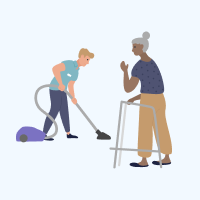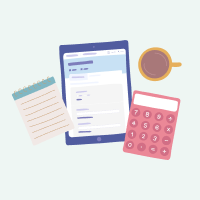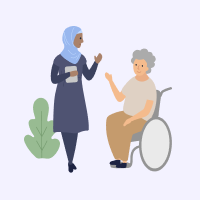Incontinence is the term used to describe loss of control of the bladder or bowel, or both. Being in control of these functions depends on being aware of bodily sensations such as the feeling of having a full bladder and the memory of how, when and where to respond.
Many people feel embarrassed or ashamed to talk about these problems. Caring for someone with continence problems can mean finding out how to expect and manage certain situations.
Who can help?
There are many services, resources, and support to help you manage when you are caring for someone with incontinence.
Local GP
If someone you care for is having problems with bladder or bowel control, it is a good idea to speak to their doctor. It can help to take along information such as:
- how often the incontinence occurs
- whether it's urinary or faecal incontinence
- when it started
- times of the day when the incontinence is worse
- whether there's complete saturation or just a small amount of urine or faeces
- whether it’s painful to go to the toilet
- medication they’re taking, if any.
Pharmacists may also be able to provide advice on incontinence products that are available for purchase, as well as direct you towards local clinics.
National Continence Helpline
The National Continence Helpline has qualified staff who can give fast, confidential and expert advice. Anyone can call for help and information about:
- continence products
- national and state government continence subsidy schemes
- resources that can be sent to you.
Visit the National Continence Helpline website for more information, or phone 1800 33 00 66 between 8:00am and 8:00pm (AEST), Monday to Friday. It is closed on national public holidays. Outside of these hours, please contact the After Hours GP Helpline on 1800 022 222.
Bladder and Bowel website
The Australian Government’s Bladder and Bowel website promotes bladder and bowel health. It also provides information about the prevention, management and treatment of bladder and bowel problems.
Continence Aids Payment Scheme
The Continence Aids Payment Scheme (CAPS) provides a payment to help eligible people who have permanent and severe incontinence to pay some of the costs of their incontinence products. Medicare makes the payment directly into a person’s nominated bank account. Find out more about CAPS on the Bladder and Bowel website.
National Public Toilet Map website
The National Public Toilet Map website provides information on the location of public and private toilet facilities across Australia. Details of toilet facilities can be found along major travel routes and for shorter journeys. Information includes location, opening hours, accessibility for people with disabilities and details of other nearby toilets. The map can help carers to plan short outings or longer trips.
Find more information on services and available support by visiting Carer Gateway.


